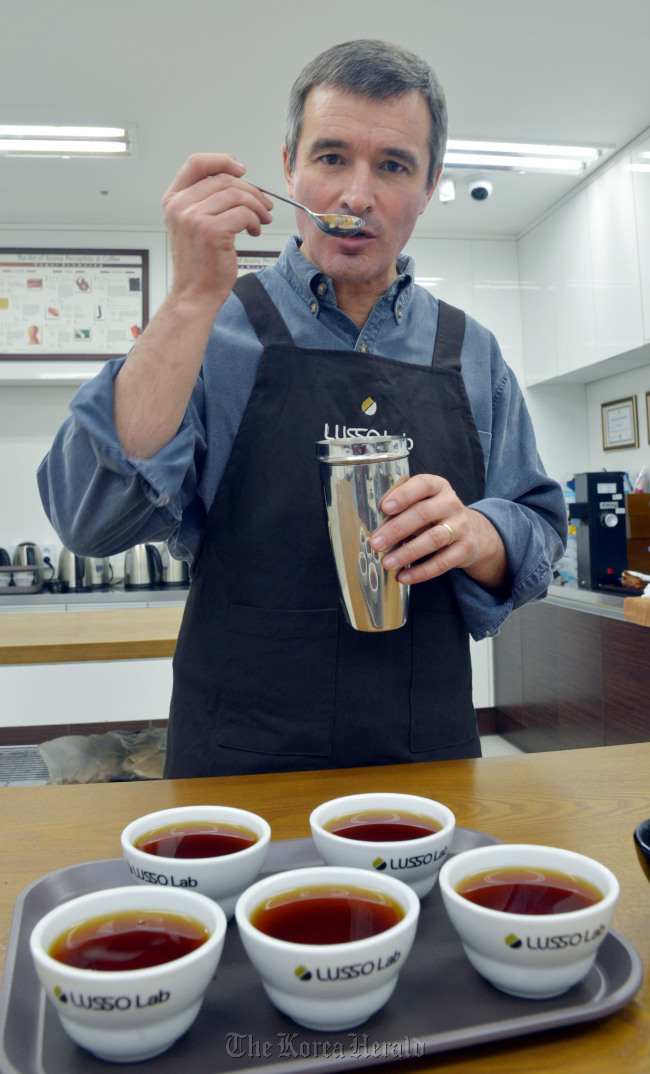Coffee guru teaches tasting skills to professionals
Number of Q Graders in Korea rising too quickly, says instructor
By Korea HeraldPublished : March 21, 2013 - 19:38
A man wearing a black apron savors the aroma of a cup of coffee, and then loudly slurps the liquid so it spreads to the back of his tongue.
He is one of five active Q Grader instructors in the world, and visited Seoul this week to supervise a test to accredit professional coffee tasters, or Q Graders.
With Korea consuming the most coffee per household in Asia, a Q Grader is an emerging career.
“Worldwide, there are close to 2,000 Q Graders now and about 15 percent of them are in Korea,” Mane Alvez said in an interview with The Korea Herald.
He is one of five active Q Grader instructors in the world, and visited Seoul this week to supervise a test to accredit professional coffee tasters, or Q Graders.
With Korea consuming the most coffee per household in Asia, a Q Grader is an emerging career.
“Worldwide, there are close to 2,000 Q Graders now and about 15 percent of them are in Korea,” Mane Alvez said in an interview with The Korea Herald.

“Considering that the test only started in Korea in 2009, the number is too big and this isn’t good for the program because it means a lot of people who are not really coffee professionals are just cramming for the test to get jobs or certificates.”
To sift out non-professionals, a “calibration” is administered every two years to see if those who passed the Q Grader exam still have the coffee cupping, or tasting, ability.
The Coffee Quality Institute, founded by the world’s largest coffee trade association, the Specialty Coffee Association of America, accredits Q Graders who pass a rigorous three-day exam, comprised of 22 sections such as green grading, roast identification, coffee cupping, sensory skills and sensory triangulation.
CQI provides training and technical assistance to coffee producers and other individuals in the supply chain to increase the value, volume and sustainability of high-quality coffee production.
Alvez noted that a genuinely professional coffee taster should be able to describe the taste.
A “Coffee Taster’s Flavor Wheel” shows dozens of different tastes and aromas that coffee can have, such as winey, acidy, enzymatic, spicy, smoky, chocolaty and herby.
“You may have the taste buds to pass the exam, but you may not be able to describe anything about the taste,” he said.
“It is more difficult to tell the taste of coffee than of wine. Wine is easier because the alcohol evaporates.”
Alvez, who has visited Korea several times over the past three years, said the quality of coffee sold here was not good as it was mostly past-crop coffee, or coffee cropped over a year ago. He has not seen specialty coffee here, or premium coffee cropped that year.
“But there is room for improvement,” he added.
“In Korea, people drink mostly espresso, but if you mix it with milk ― it is impossible to tell if it’s specialty coffee or not.”
Specialty coffees are distinctive because of their full cup taste and few defects. They take up about 10 percent of the U.S. coffee market.
Alvez, formerly a winemaker from Portugal, followed a woman to California and later moved to Vermont where he has been working with coffee for the past 25 years.
He runs two companies ― Artisan Coffee which roasts coffee and Coffee Lab International which tests coffee and educates coffee professionals.
His company sells specialty coffee to supermarkets, retailers and a few individuals within only 80 kilometers.
“You place an order and then we roast. That makes the coffee very fresh,” he said.
He travels to a dozen countries including Mexico, Nicaragua, Guatemala, Colombia, El Salvador, Peru, Brazil, Ethiopia, Kenya and Indonesia each year to buy coffee.
“The best Ethiopian and Central American coffees come between February and March, and Brazilian comes much later,” said Alvez whose favorite is East African coffee.
By Kim So-hyun (sophie@heraldcorp.com)
-
Articles by Korea Herald








![[KH Explains] Hyundai-backed Motional’s struggles deepen as Tesla eyes August robotaxi debut](http://res.heraldm.com/phpwas/restmb_idxmake.php?idx=644&simg=/content/image/2024/05/16/20240516050605_0.jpg&u=20240516155018)










![[Today’s K-pop] NewJeans hits 600m Spotify streams with ‘Ditto’](http://res.heraldm.com/phpwas/restmb_idxmake.php?idx=642&simg=/content/image/2024/05/17/20240517050510_0.jpg&u=)